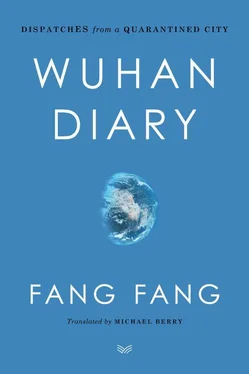This afternoon my old classmate who goes by the nickname “Old Fox” sent me a message. Old Fox’s father, Mr. Hu Guorui, was once my poetry teacher. Mr. Hu was an excellent lecturer; a lot of students from other departments also enrolled in his classes, which were always packed. Eventually they had to move his class to a larger classroom in the Laozhaishe building. Back when I was in his class, there was a poem he taught us that wasn’t in our textbook. He recited it to us:
Coming and going amid the misty water,
for ten years I claimed to have been raised on West Lake.
On my light rowboat,
I float past the bay overgrown with reed-catkins.
In my pleasure I break out in song,
on this silent night my voice rings clear.
But there is no one present to appreciate it,
instead I clap for myself,
as my song reverberates through the endless mountains. [16] This is a self-reflective poem attributed to the Abbot of the Lingyin Temple in Hangzhou, Master Huiyuan (1103–1176). Huiyuan lived during the Song Dynasty and his successor was the famous monk Ji Gong (1130–1207).
I can still remember the way Mr. Hu kept the rhythm and exclaimed his appreciation for this poem as he recited it. The image is as fresh in my mind as yesterday. Old Fox was a member of the class of 1977; he loved to travel, he even went to America to hike the entire Appalachian Trail. The whole trip took several months and he kept a complete record of his journey as he went. It was really an incredible trip. At first I thought he was the first Chinese to complete the entire Appalachian Trail, but he later told me he wasn’t, but he was quite confident that he was the first person from Wuhan to do it.
The news that Old Fox forwarded to me today was really quite shocking. I’ll copy the two items he sent below:
1. I wanted to report some good news; Yi Fan has been taken off the ventilator machine and is awake. He even recorded a short video to say hello to some of his old classmates. Yi Fan’s nine-year-old daughter also made her dad a whole bunch of get-well cards. Hu Zha also came out of his coma; this is really a miracle for the Sino-Japanese Friendship Hospital in Beijing.
2. Yesterday you mentioned two doctors from the front lines who were now struggling for their lives, Dr. Yi Fan and Dr. Hu Weifeng (Hu Zha is Hu Weifeng’s nickname); they both happen to be classmates of my jogging partner. She sends me updates every day on how they are doing, and today she told me that they have both woken up.
There is no better news to get than that as we are struggling through these depressing days. Dr. Yi Fan is the assistant director of the Thoracic Surgery Department at Central Hospital, and Dr. Hu Weifeng is the assistant director of the Department of Urology at the same hospital. Two days ago the newspapers were reporting that both of them were still in critical condition; I also mentioned that in my diary. The fact that both of them have now woken up is simply marvelous news. I hope these two doctors can hold on; I’m confident that their physicians will be able to find a way to help them both recover.
The heavy number of casualties suffered by medical caregivers at Central Hospital remains a widely discussed and controversial topic. But up until now, I still haven’t heard any news about any of the hospital administrators facing any kind of disciplinary actions. Even as endless appeals for the hospital leaders to take responsibility continue to appear online, the people running Central Hospital have remained unusually silent on this issue; it is as if they can make the criticism disappear by ignoring it. This is very different from the situation with the district head of Wuchang and the assistant district head of Qingshan, who were both removed from office before there was even a public call for them to step down. It’s hard for me to understand what standards top leaders go by when making decisions about how to discipline officials in situations like this. All I know is that the number of people killed or injured in an incident never guarantees that a leader will step up to take responsibility for what happened. But I had better stop talking about this particular topic here; it won’t be good if I keep going.
There has also been all kinds of online chatter on the topic of journalists today; some of the discussions have been quite detailed and interesting. I would also like to chime in a bit: Dr. Ai Fen from the Central Hospital is now calling herself the “whistle-giver”; the public has been referring to Dr. Li Wenliang as a whistleblower. That means that the whistle has been passed from Ai Fen to Li Wenliang, which makes me wonder who the torch will be passed to next. Although Dr. Li Wenliang was reprimanded, they never confiscated his “whistle.” It was actually the police’s action that amplified the sound of his whistle. The appearance of the novel coronavirus was already made public on December 31, 2019. At the very least, that is the day that I received the news. The following day, reports that local police had reprimanded “eight netizens” appeared all over the media, including CCTV. But that doesn’t necessarily mean that the “whistle” had been confiscated. So who should now take up the whistle? Whose turn will it be to step up and become the next whistleblower?
There are two large media groups here in Wuhan; the largest is, of course, the Hubei Daily News and Media Group, and the second largest is without a doubt the Yangtze Daily Newspaper Group. How many reporters are employed between these two companies? I’m not sure, but according to the search engine Baidu, the Hubei Daily News and Media Group “controls 7 newspapers, 8 magazines, 12 websites, 5 mobile platforms, 1 publishing company, 56 companies (in which they are the sole investor or controlling stockholder), and they have 17 station offices located throughout Hubei Province, making them the largest news and information platform for the outside world to understand important news coming out of Hubei.” Looking at this structure, I’m sure that the Yangtze Daily Newspaper Group also has its fair share of subsidiary publications, magazines, websites, and companies, but I’m too lazy to look all of that up. But I think it is safe to assume that these two massive companies employ quite a large number of reporters and journalists.
This brings us to ask what the professional responsibility and mission of journalists really is. There may be multiple ways to answer this question, but according to my understanding, the single most important mission for them should be to pay close attention to our society and the people’s livelihood. If that is indeed the case, then I have to ask, after the explosive news of the discovery of the novel coronavirus and then the news of the “eight netizens” who were admonished by the police, which was also a pretty big story, how come they didn’t follow up on these major stories that were directly connected to our society and the people’s livelihood? How come they didn’t investigate how the coronavirus was discovered? How come they didn’t investigate whether or not is was contagious? Why didn’t they look into who these “eight netizens” were, and why they were “spreading rumors”?
When it comes to incidents like these, professional journalists should have a high degree of professional sensitivity; they should have been the ones to carry Li Wenliang’s torch as whistleblowers. But where were they? Don’t people often say that “If a reporter isn’t at the scene already, they are on their way to the scene”? If at the time there had been reporters who took a deep, hard look at the origins of the novel coronavirus, if they had understood that doctors working at Central Hospital were collapsing at record numbers, or if they had uncovered the fact that the “eight netizens spreading rumors” were in fact all doctors, then perhaps, just perhaps, things may have turned out differently. But that would have required them to have a higher level of professionalism; they would have had to have worked hard to build ties and negotiate with various platforms to ensure that their voices were heard. If all that had happened, I wonder if Wuhan would be facing such a horrific scene as it now faces. Would we have this phenomenon of everyone in Hubei Province being quarantined and abandoned? And nationwide would we still be facing all kinds of different losses?
Читать дальше



![О Генри - Закупщик из Кактус-Сити [The Buyer from Cactus City]](/books/405348/o-genri-zakupchik-iz-kaktus-thumb.webp)








